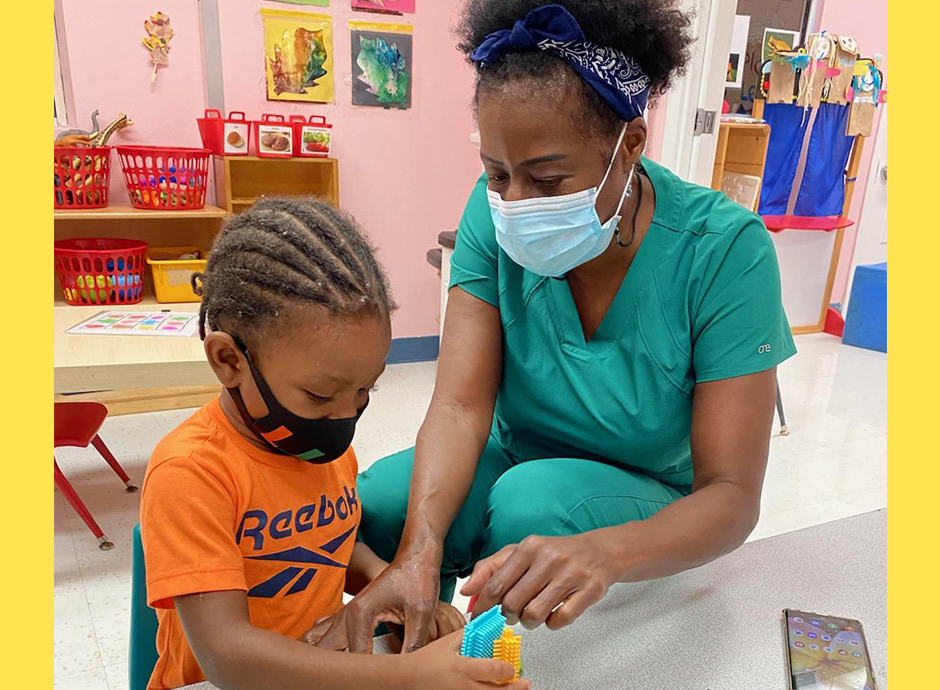In March when Miami-Dade Public Schools suspended all in-person learning due to the COVID-19 pandemic, the Linda Ray Intervention Center, a program based in the College of Arts and Sciences Department of Psychology, was required to do the same. Since 1993, the center has provided early intervention and collaborative programming for children living in at-risk environments and communities impacted by substance abuse, addiction, poverty, and lack of social support.
When the center closed its doors due to the pandemic, its teachers, counselors, service coordinators, and clinicians needed to think fast, so they developed a virtual-service plan for families with babies and toddlers with developmental delays—and the task seemed daunting and insurmountable.
Lynne Katz, director of the center and faculty member in the Psychology Department, says it took unrelenting creativity, determination, expansive collaboration, and a resilient mindset to continue the center’s mission and top priority: To make sure children and their families remained engaged, although virtually, and to support staff who had not taught online before.
“In the beginning, our goal was always to find creative ways to keep the children engrossed when they sat in front of their home virtual devices, but we also had to provide our low-income families with the technological resources that they needed to remain connected to us and the Linda Ray Center,” says Dr. Katz. “We had to find creative ways to buy materials or receive donations, so that our families had the tools they needed to continue the learning process at home. We even parleyed with Internet providers to offer free or cheaper services for some of our families.”
As teachers, explains Dr. Katz, making sure children are engaged and interested in their lessons is always a top priority, and when the center went virtual, the teachers and counselors did their best to make sure every under-resourced child was virtually connected and could participate in hands-on activities at home.
“We put together boxes of school supplies that families picked up or were delivered. The boxes contained items like crayons, arts and crafts materials, puppets, bubbles, books, and other vital materials to help the children learn along with their teacher, ”says Dr. Katz.
From training sessions with UM’s tech-support staff to becoming computer savvy and participating in weekly staff-support group meetings, the center’s 18 staff members slowly but surely made the transition from in-person teaching to online educators. Partners like the UM School of Nursing undergraduate program continued their clinical practicums virtually, assisting the center with online health-focused surveys for the parents to find out their health questions, and a virtual health fair addressing the identified needs. They also provided virtual workshops for staff and parents on topics relevant to dealing with flu season and the impact of COVID-19 on their families.
“We really had to pivot and think outside of the box,” says Dr. Katz. “Overall, every idea and project component had to be redesigned virtually from the ground up, including conducting assessments and intake meetings and parent-teacher conferences virtually.”
In October, the center shifted its delivery from solely online to in-person, which Dr. Katz says, was made possible through leadership and assistance from UM, particularly the Facilities Department. “They helped us to rethink the classroom space,” she adds. “They brought us the signage and personal protective equipment we needed to be safely in the building, and they provided the critical sanitizing and cleaning procedures to maintain our classrooms as safe spaces.”
The center’s staff maintains the Centers for Disease Control and Prevention (CDC) guidelines for social distancing with fewer children in each classroom, mandatory mask protocols for themselves and for the children age two and older, regular temperature checks, and daily symptom checking. Classes are scheduled on the playground one class at a time, and there is no cross-mixing of classroom groups during the day.
“The COVID-19 pandemic has been a test of what it means to be flexible, creative, and supportive of families and staff,” says Dr. Katz. “We could not have done this without the University’s assistance, the contributions of our private donors and the facility maintenance from Infants in Need.
“We didn’t close our doors for good. Instead, we persevered and never lost sight of what was always important – to provide support to the most vulnerable children and families in our community and to validate the commitment of our staff, who rose to the occasion from the beginning and journeyed with us into this new normal with their high level of commitment and compassion,” adds Dr. Katz.
To learn more about the Linda Ray Intervention Center, click here.

